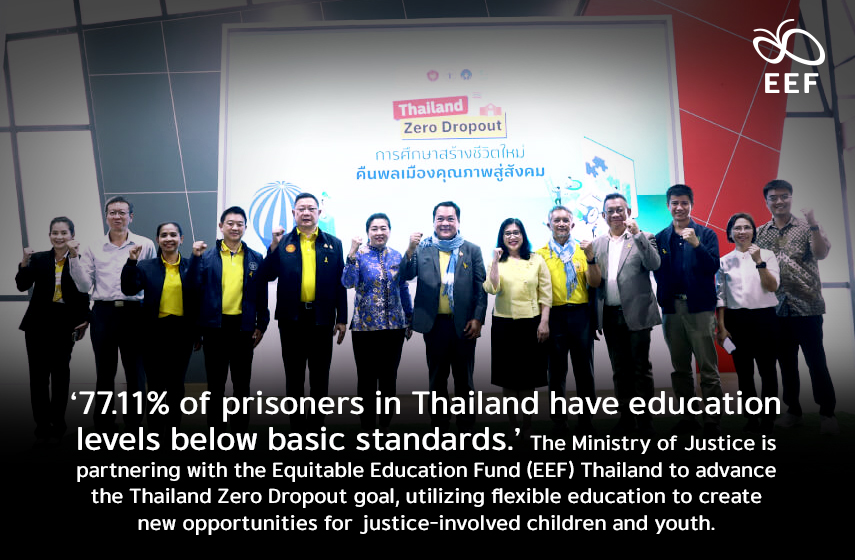
At Sanfun Atrium, TK Park Yala in Yala Province, the Ministry of Justice, in collaboration with the Equitable Education Fund (EEF) Thailand, announced a joint initiative to tackle the issue of children and youth dropping out of the education system, aiming for a zero dropout rate under the Thailand Zero Dropout project. The theme is “Education Transforms Lives: Empowering Future Citizens.”
Pol. Col. Thawee Sodsong, Minister of Justice, outlined policies and strategies in partnership with the Equitable Education Fund (EEF) Thailand and other network collaborators. The goal is to provide education to over 230,000 justice-involved children and youth who have dropped out, including those in the southern border provinces. The Equitable Education Fund (EEF) Thailand aims to enhance human capital to combat intergenerational poverty and reduce educational inequality. This initiative supports the government’s policy of making Thailand’s Zero Dropout a national agenda. The Cabinet resolved that all agencies should implement measures to address the dropout issue, working towards a zero dropout rate.
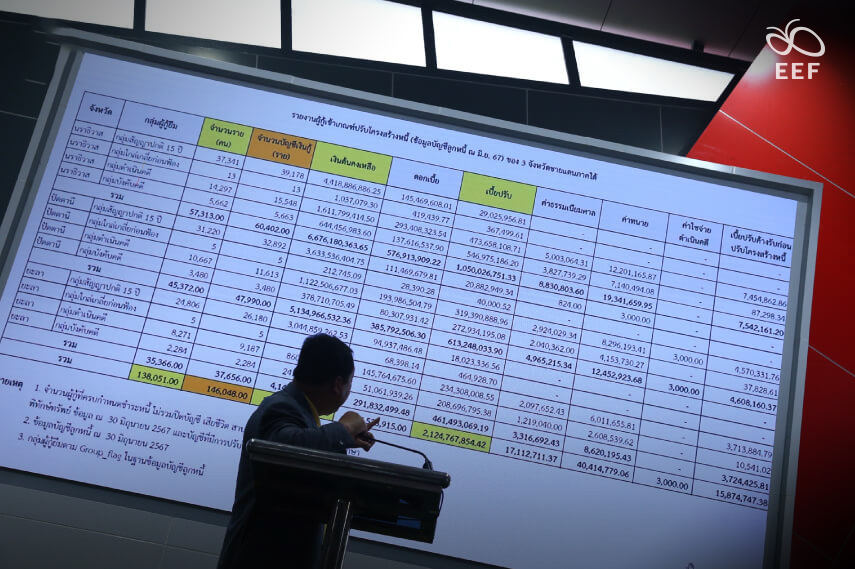
According to data from the Equitable Education Fund (EEF) Thailand, over 1.02 million children aged 3-18 are out of the education system, spanning from kindergarten to high school. The Ministry of Justice, which oversees agencies responsible for justice-involved children and youth, including the Department of Corrections, the Department of Probation, and the Department of Juvenile Observation and Protection, found that among 299,499 prisoners, 230,914 have education levels below basic standards, accounting for 77.11%.
Among these, 28,356 prisoners, or 9.47%, had no education before incarceration. The largest group, 117,415 prisoners (39.21%), had completed primary education. This is followed by 85,143 prisoners (28.43%) with lower secondary education, 40,074 prisoners (13.38%) with upper secondary education, 10,939 prisoners (3.65%) with vocational certificates, 8,939 prisoners (2.99%) with higher vocational certificates (diplomas), 7,565 prisoners (2.53%) with bachelor’s degrees, and 1,018 prisoners (0.34%) with education beyond a bachelor’s degree. Among these prisoners, 217,628 were involved in drug-related offenses, and 135,269 were repeat offenders.
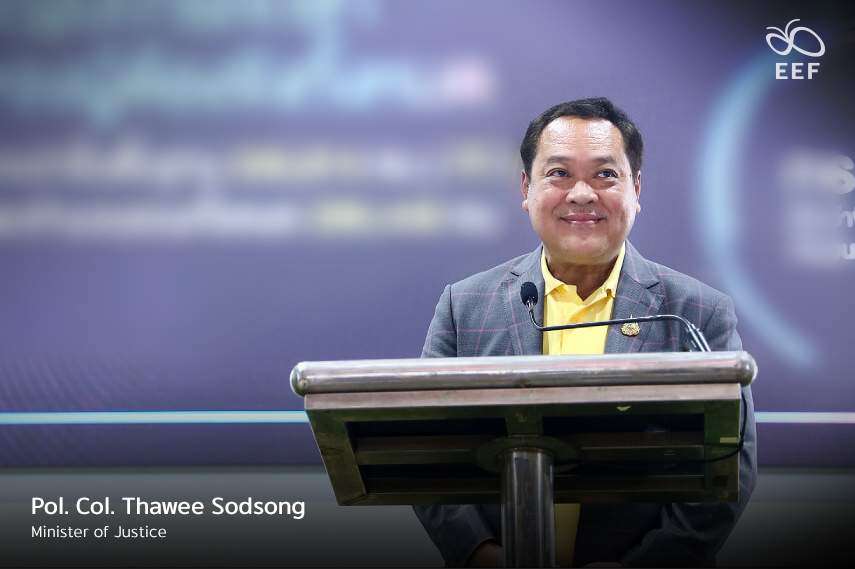
Pol. Col. Thawee Sodsong is confident that education is key to providing offenders with the opportunity to reintegrate into society. Flexible education curricula must be tailored to each child and youth. Offering education to justice-involved children and youth is considered one of the largest foundational education initiatives in Thailand. Recognizing its importance, he has directed the Ministry of Justice’s agencies in the southern border provinces and other ready regions to take the lead as models for nationwide implementation.
“Today, we have identified that the majority of those without basic or compulsory education are in prisons. This is an educational crisis that all relevant stakeholders must address. We need to determine how to ensure that everyone under the care of the 143 correctional facilities, often referred to as ‘those behind the walls,’ receives equal access to education as those outside. This education must be of high quality, covering basic education, vocational education, and various professional skills, with programs designed to meet the specific needs of prisoners in each region.”
The Minister of Justice emphasized that tackling inequality in the southern border provinces requires recognizing education as a form of justice, which should take precedence over military and political approaches. He tasked the Department of Juvenile Observation and Protection, in partnership with the Equitable Education Fund (EEF) Thailand, with designing curricula that provide diverse educational options, including flexible learning for justice-involved children and youth. These programs will be delivered through learning centers outside the traditional system. Several initiatives have already been launched with the Equitable Education Fund (EEF) Thailand, including encouraging private sector involvement in educational management through learning centers, supporting educational equivalency, and offering vocational training for children and youth in the criminal justice system.
“This issue is a crisis, an unseen danger, and a form of violence. Solving the education problem will help resolve prison overcrowding. I believe this is the greatest challenge facing the southern border provinces today. Only 55% of all prisoners in the region have completed basic education. This is a crisis that must be addressed with determination, helping young people who have gone astray become valuable resources for the country.” said Pol. Col. Thawee.
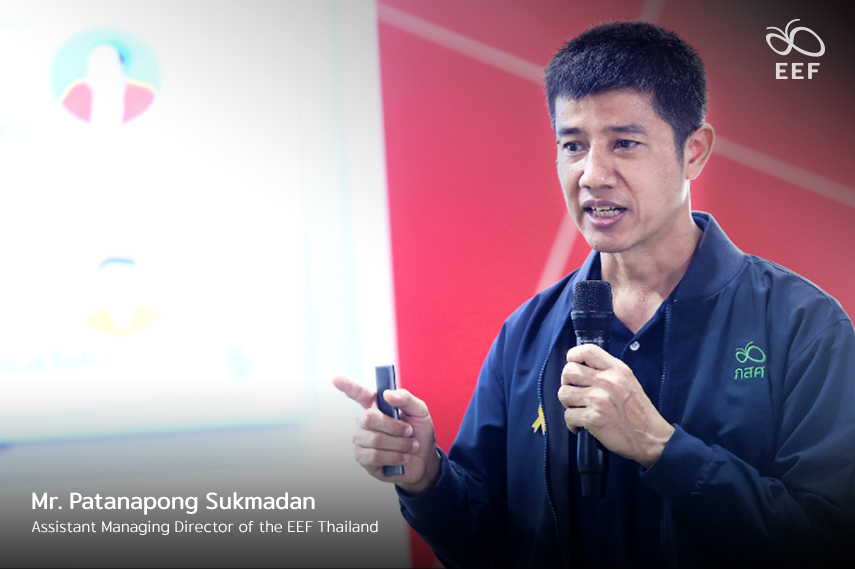
Mr. Patanapong Sukmadan, Assistant Managing Director of the EEF Thailand, stated that over the past five years, the Equitable Education Fund (EEF) Thailand has supported scholarships for children in the southern border provinces to reduce inequality and tackle intergenerational poverty in collaboration with various educational institutions. This includes the CCT program for poor and extremely poor children in both compulsory and higher education. The Equitable Education Fund (EEF) Thailand has also provided advanced vocational innovation scholarships, such as the Practical Nurse program in partnership with the Faculty of Nursing at Princess of Naradhiwas University. This enables employment after just one year of study. Other initiatives include vocational and skills training programs in collaboration with Pattani Fisheries and Agriculture Technology College, the ‘Kru-Rak-Thin’ scholarship for higher education, and support for area-based education to reduce inequality in cooperation with Yala Municipality and the Pattani Chamber of Commerce. These programs promote flexible education and offer alternatives to meet the needs of students, including through the Islamic Education Center at Ba Ngo Yue Rae Mosque, providing children with a variety of learning options.
Justice-involved children and youth who have dropped out of the education system are another target group for the EEF’s Thailand Zero Dropout project. After collaborating with multiple agencies to initiate efforts in 25 provinces during the first phase, the project uses the ‘Thai Zero Dropout’ application to support its mission. The app aids in identifying and supporting dropouts, creating individual care plans, coordinating assistance at both local and national levels, and tracking progress, with the goal of covering all 77 provinces by 2027.
The Southern Border Provinces Administrative Center (SBPAC) provided data consistent with EEF’s findings, showing that approximately 7% of children and youth aged 6-18 in Yala, Pattani, and Narathiwat were not enrolled in the education system during 2022-2023. Additionally, there was a noticeable decline in student numbers from Grade 1 to Grade 12, particularly during the transition from Grade 6 to Grade 7, and a significant drop in Grade 10. Pattani experienced a 20% decrease, Yala a 17% decrease, and Narathiwat a 23% decrease.
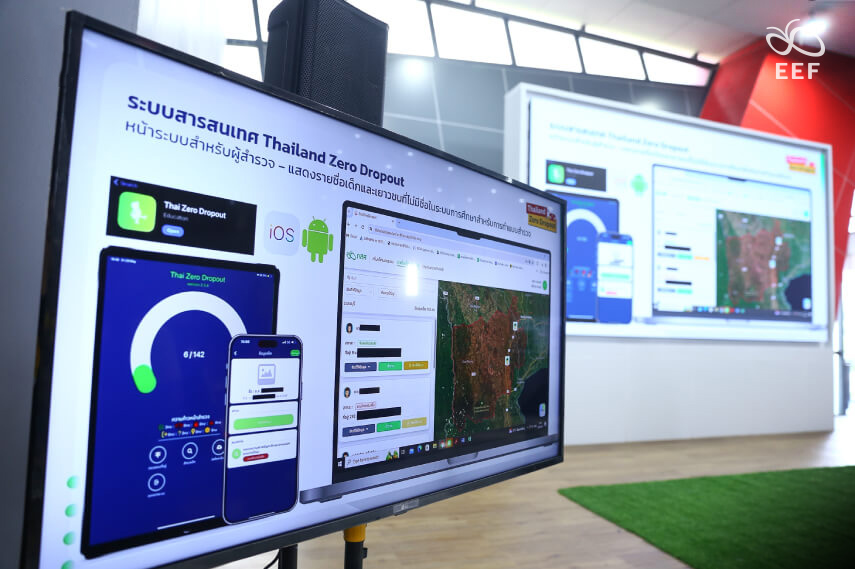
This collaboration between the Equitable Education Fund (EEF) Thailand and the southern border provinces will involve conducting surveys to gather accurate data before creating individual care plans, which will also include justice-involved children and youth. Equitable Education Fund (EEF) Thailand has previously worked with the Department of Juvenile Observation and Protection to tailor education to the specific context, identity, and needs of these children and youth, helping them return to education. We will use this experience to collaborate with two additional Ministry of Justice agencies, the Department of Corrections and the Department of Probation, to develop flexible education solutions aimed at achieving the Thailand Zero Dropout goal.
“The partnership between the Ministry of Justice and the Equitable Education Fund (EEF) Thailand also seeks to expand collaboration with the private sector and local businesses in the three provinces. This will involve designing education programs that align with local labor market needs and support job creation and income generation. We will apply the Department of Juvenile Observation and Protection’s experience to broaden these efforts to other target groups.”
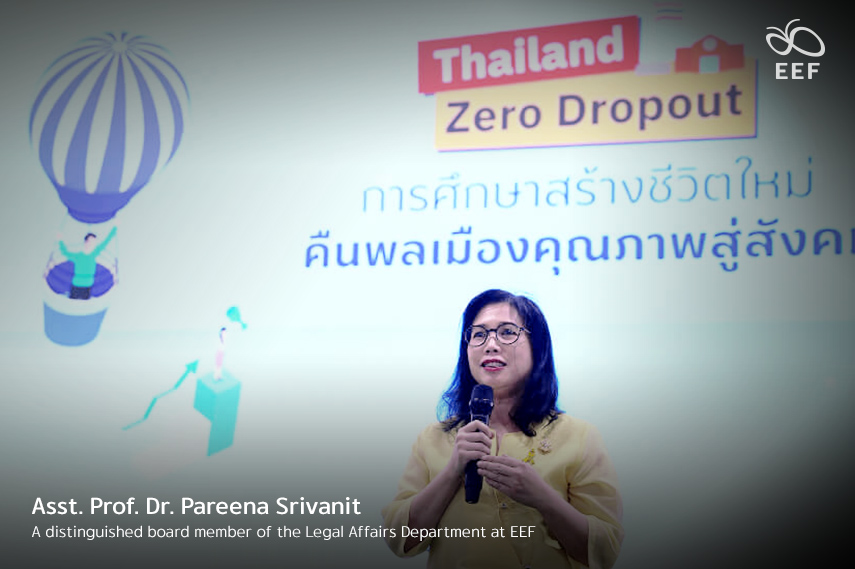
Additionally, Asst. Prof. Dr. Pareena Srivanit, a distinguished board member of the Legal Affairs Department at EEF Thailand, advisor to the Minister of Justice, and Dean of the Faculty of Law at Chulalongkorn University, stated that education is a fundamental human right protected by the Universal Declaration of Human Rights, the Convention on the Rights of the Child, and the Constitution. However, the statistics on children outside the education system and data from the Ministry of Justice reveal the challenge of aligning the care of children and youth with these legal frameworks. EEF’s role is to connect stakeholders and enhance systemic mechanisms and resources to ensure educational equity for all children and youth.
“The Ministry of Justice is a leading example with a vision for providing education to individuals in the justice system, championing the concept of flexible education to help them access educational opportunities before reintegrating into society. This approach aims to facilitate their re-entry into the standard education system by focusing on their mental well-being and quality of life, preparing them for learning and transforming teachers’ roles from guards to educators who support basic education for those who have gone astray, thereby advancing curriculum and personnel development.
” The Equitable Education Fund (EEF) Thailand will also catalyze mobilizing systemic support. Over the next six months, we will assess the lessons learned to develop a model aimed at achieving Thailand Zero Dropout under the Ministry of Justice, ensuring that justice-involved children and youth can return to the education system and become valuable members of society,” said Asst. Prof. Dr. Pareena.

